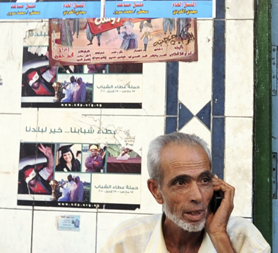Egypt in virtual communications blackout
Egypt currently has no internet access after the last major server still up-and-running went down on Monday night, but some mobile phones are still working, Channel 4 News understands.

The percentage of Egypt‘s population accessing the internet stands at zero after the Noor provider went down ahead of the “march of millions”.
Noor, which is used by about 8 per cent of the population, had been the only up-and-running service since the other four major providers went down on 27 January.
Experts at Renesys – a network security firm in New Hampshire, which studies internet disruptions – believe Noor was allowed to remain on air because it provided we access to several companies vital to the Egyptian economy’s interests: the Egyptian Credit Bureau, Exchange, Allianz Insurance Egypt, Coca Cola, Exxon Mobil and Commercial International Bank.
The four other major servers – Link Egypt, Vodafone/Raya, Telecom Egypt, Etisalat Misr – all went off air within minutes of each other on 27 January.
Jim Cowie, co-founder of Renesys, said: “There’s no way around this with a proxy. There is literally no route. It’s as if the entire country disappeared.”
“It’s as if the entire country disappeared.” Telecom expert Jim Cowie
Experts say that the slight delays in their so-called kill-switches being flicked suggests the Government ordered them to shut down all international connections separately, not simultaneously.
Pressing the kill switch on more or less an entire nation’s internet capabilities is not unprecedented.
During an army-imposed state of emergency in Bangladesh – with its population of 160 million – in 2007, internet and mobile connections were turned-off for more than 24 hours.
However the Channel 4 News team of correspondents in Alexandria have said that some mobile phones are working, despite widespread reports that access had also been blocked in Egypt.
Jon Snow said that calls could be made on mobiles, but SMS text messages could not be sent.
Vodafone: Government forced switch-off
On Saturday, Vodafone, with 28 million mobile phone customers in Egypt, and France Telecom restored mobile voice services, one day after service stopped because the government demanded the cut-off.
In Davos, Vodafone CEO Vittorio Colao said “Egyptian authorities” had asked the company to “turn down the network totally.”
Mr Colao said Vodafone determined that the request was legitimate under Egyptian law, and therefore complied with the request.
“I hope the decision will be reversed by Egypt very soon”.
A statement on the Vodafone website read: “Any actions we take in Egypt will be judged in light of [employees’] continuing well-being”.
Analysts said that there is not a kill switch that can stop mobile oral communications, unlike the sending of texts and data by phone, and internet communications.
Fekki slammed for Al Jazeera ban
Meanwhile, the Egyptian Government has received widespread condemnation for its decision to shut down Qatar-based Al-Jazeera’s operations in Egypt.
Earlier, the Information Minister, Anas el-Fekki, ordered “the suspension of operations of Al Jazeera, cancelling of its licences and withdrawing accreditation to all its staff as of today.”
Reporters Without Borders secretary-general Jean-François Julliard heaped scorn on the move, saying: “By banning Al-Jazeera, the government is trying to limit the circulation of TV footage of the six-day-old wave of protests.
“This totally-archaic decision is in complete contradiction with President Hosni Mubarak’s promise of ‘democratic’ measures on 28 January. It is also the exact opposite of the increase in freedom sought by the Egyptian population.”
At the time of writing, Al-Jazeera was continuing to operate 24-hour coverage of the uprising.
The internet search engine company, Google, and the social media platform, Twitter, have teamed up to help those on the ground in Egypt post status updates without having access to the internet. Channel 4 News Technology Correspondent Benjamin Cohen says the move is to circumnavigate the Egyptian government’s self-enforced national internet blackout. To read his blog on Speak to Tweet, click here.